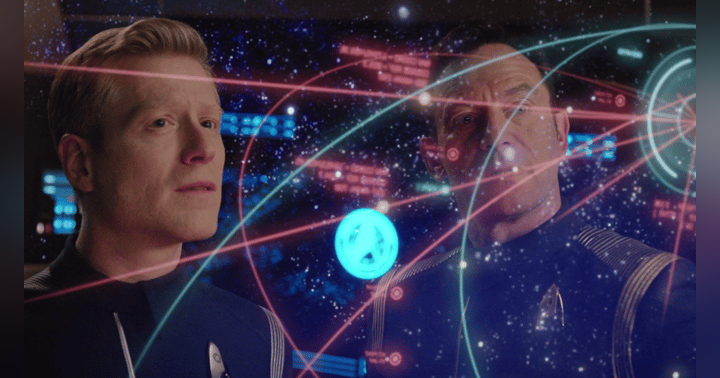Selfish vs. Selfless

Have you ever felt manipulated at work? What about slipping into manipulation yourself? Why do we use this tactic in the first place? Most likely because we want something from another person and we either don’t have the skills to, or don’t think we can ask directly. In the Discovery episode Lethe we see how Lorca attempts to take advantage of his crew through the use of manipulation. But I want to show you how to get what you want, not by manipulating another person, but by giving them what they want. Sound too good to be true? Keep reading.
You’ll have to watch the episode to appreciate the full context, but the basics are that Burnham has good reason to believe that Sarek is in danger and so she begs Lorca, her superior officer, to search for him. He agrees and they set out on the mission even though it means going against protocol and endangering Burnham in the process. When the mission is successful, Burnham thanks Lorca for allowing her to rescue Sarek. He says he did it because she’s a part of his team and offers her an official spot on Discovery as a Science Specialist. She accepts and then says something that I find confusing, “I’m grateful to serve under a captain like you.” There is very little that would lead me to believe Burnham should be grateful. I believe that something else is at play - masterful manipulation by Lorca.
We know that it is Lorca’s character to do whatever it takes to accomplish his goal, including actively manipulating people and situations. He does this, in part, through his amazing skill of identifying what motivates a person. He is able to tell what matters to them most. We’ve seen this multiple times throughout this season of Discovery. In this episode alone, he defied protocol to let Burnham go after Sarek. He made it clear he couldn’t care less about Sarek, he just wanted to do something that would matter to Burnham. He also offered her a spot on the bridge. An opportunity to do science stuff in a way that matters and puts her in the middle of all the action. Lastly, he played on her emotions. Lorca knew Burnham was feeling out of control after the mission so he tossed her a lifeline in the form of a job offer.
The last thing I want you to do is to read this and then start manipulating people! The lesson here is to learn from Lorca, but don’t be like him. He will use people to get what he wants, even if it means giving them some of what they want. Instead, I want you to see the positive power you can have when you tap into what matters to other people.
We’ve talked about the importance of getting to know the people you work with. To develop professional and meaningful connections with them. Here’s an example of how to do that. Recently, I hired a new manager. This person leads a team of 20 people that do analytical work. Their work is highly measurable and they are responsible for contributing to some relatively high profile Key Performance Indicators (KPI) for our organization. If you were just given the responsibility to lead this team, what would you do? More specifically, what would the traditional management model compel you to do? If you guessed meet with everyone to check in on their work, determine how they track their metrics, and set up regular check-ins on the work, you are correct!
But that is wrong.
Sure you meet with everyone. But talking with them solely about their productivity is the wrong approach. Instead, follow the example of my new manager by asking questions like:
What do you like about your work? What don’t you like?
How do you like to receive feedback?
Do you prefer praise in public or privately?
What can I do, as your manager, that will cause you to lose respect for me or the organization?
If money wasn’t an issue, what would you do with your life?
Did you notice a trend? My new manager didn’t ask for anything from the person. They didn’t ask for metrics, reports, or updates. They asked about the person. They got to know their employee. Work stuff is bound to come up, of course, but it’s not the focus. Over time, this will help you form an important connection with your staff. One of rapport where you, as the leader, understand what motivates each member of your team. It helps you lead them better, with their goals and desires in mind, as you work to accomplish your organization’s goals.
If I can hammer one point home through the Starfleet Leadership Academy, it’s this: the ONLY thing that matters in your organization are the people that work there. As a leader, your primary purpose is to support them. The work is a side effect. You treat your people with dignity and respect and they’ll do the work. In fact, the more dignity and respect you offer, the better the work will be.
Lorca does this really well. Early in the episode, when he and Ash Tyler are in the combat simulator, he asks a lot of questions about his personal history. On top of this, he read his service record and researched him. He’s done the same with Burnham. The difference between what Lorca does and what you are going to do is in the motivation and the end-game. His motivation is to serve his purposes. Your motivation is to help your employee be the best they can be in their given position. Selfish vs Selfless. At the end of the day, Lorca’s approach may be effective in the short term, but it is not at all sustainable. The selfless approach is. It’s the ultimate kind of sustainability. It’s self-sustainable, meaning it feeds and grows upon itself! The more time you invest in the people you work with, the better everyone gets. It’s truly incredible.
I love how much we’re able to learn from Lorca by adopting the opposite of what he does! He just proves you can learn from both good leaders and bad. Do you know what motivates your people? If not, it’s time to find out! Set those meetings, ask good questions, and move toward selfless success!


